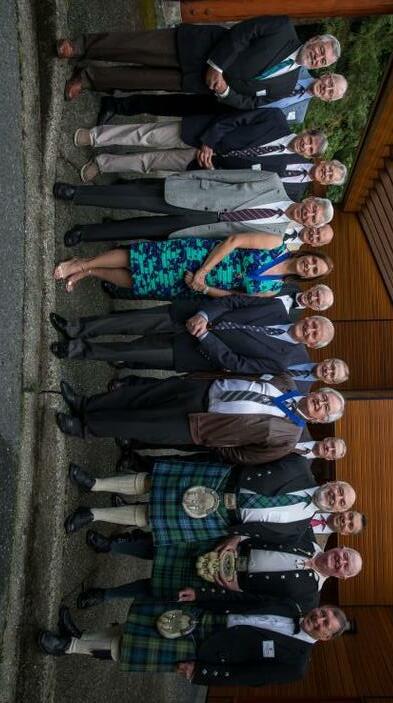
3 minute read
Another Bequest
Another Surprise Bequest
The Bequest intimated on the previous page took everyone by surprise, not least the School, but this was history repeating itself. One day in 1928 the then Rector, Mr David Andrew, received a letter from Lord Alness, the Lord Justice Clerk and a loyal friend of the School, containing a cheque for £500 from Col. George Waters to be used in some suitable way as a memorial in the School to his brother, Mr John Waters, who had been a pupil in 1850.
Advertisement
It was suggested later that the Rector must have almost fainted from shock: it was as if a long lost uncle had died in America leaving his entire fortune to his nephew. £500 in 1928 was a huge sum of money. At least on this occasion the use to which the gift was to be put was left to the School authorities through the Education Committee. After lengthy consideration of a variety of suggestions it was resolved that the money be expended on the provision of a two-manual and pedal pipe organ in the School hall. A providential further gift to the school of £200 enabled the installation to be completed, with the pipework concealed within a lattice-work proscenium on the corridor side of the hall.
The convener of the Secondary Schools Management Committee, presiding at the inauguration ceremony on 24 January 1930, while admitting that he was not a trained organist, said that he was impressed by the skills of Mr E.H. Lawton, the Aberdeen organ builder, and the assurance that the instrument was ideally suited to the size of the hall and would enhance the musical reputation of the School.
The instrument had four stops on the Great organ, six stops on the Swell organ and three stops on the Pedal organ, with the usual couplers and accessories.
Mr. Gavin Falconer, the then Music Master, exhibited his characteristic great artistry in a recital at the close of the opening ceremony. He demonstrated the quality of the new instrument by playing the Allegro from Handel’s second organ concerto, “Barcarolle” by C. Roberts, “The Voice of Spring” by C. Vincent and the Processional March by C.M. Birch
When the modern Hall was built in the 1960s the organ was removed and reinstalled where it now is to the left of the Platform. Whereas at the time of its first construction it was in daily use for morning assemblies and was also put to good use by pupils learning to play the instrument, usage is now infrequent.
Sunday
The Denner past wi’ din and clatter, Oor faces shined wi’ soap and watter, Aaf tae the kirk the family traivelled, Tae hear the knotty points unraivelled, Wi’ mony a warnin’.
In pews we sit wi’ solemn faces –Tae mak’ a noise wid fair disgrace us; Wi’ collars stairched we suffer sairly; We hope to hear the Amen early That lats us oot.
Ootside the kirk the birdies sing, And in the sun they tak’ their fling, Bit we maun sit sae douce an’ proper, And fan the plate comes gie oor copper For ither heathen.
The bees drone roun’ the ivy wa’s, The preacher drones wi’ ne’er a pause, An’ now and then wi’ baleful e’e He turns aroun’ an’ glares at me For nae attendin’.
Oor mither sits just up the pew, She keeps her e’e on me an’ you, For weel behaved her loons maun look; What pains wi’ us she surely took Tae mak’ us guid.
The sweetie passed aneath the seat, To keep us quait she hid tae dee’t; And foo – at last the sermon endit –Our parents ay we sair offendit By rinnin’ oot!
The folk a’ gaithered roon’ the door And fauts in sermon they’d deplore, While to the Burnie we would rin; Oor boots were aff, and we were in And happy widein’
This trim Doric poem was first published in the Magazine of October 1914 and again in June 1957. It speaks of a time long gone – what a change one hundred years can bring.



